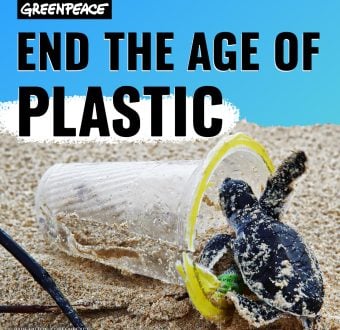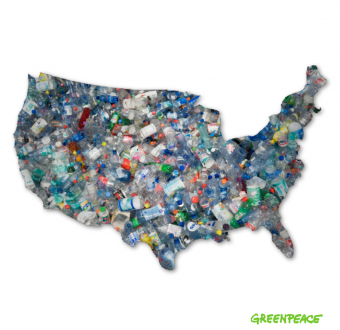Washington, DC – Greenpeace Inc. filed a lawsuit in California Superior Court today, alleging that Walmart has employed unlawful, unfair, and deceptive business practices by incorrectly labeling and advertising its various private label throwaway plastic products and packaging as recyclable. Through the suit, Greenpeace is demanding that Walmart remove false and misleading labels stating that its disposable plastic products and packaging are recyclable, when they are not. Greenpeace alleges that Walmart has violated California consumer protection laws, including the California Environmental Marketing Claims Act (EMCA) which regulates deceptive environmental marketing claims.
“Walmart knows that its customers are concerned about single-use plastics, and has been using misleading labels that falsely claim packaging is recyclable when it is bound for an incinerator or landfill,” said Greenpeace Inc. Oceans Campaign Director John Hocevar. “Until Walmart and other polluting corporations take responsibility for the damage their throwaway plastic is doing to our environment and our communities, the plastic crisis will continue to get worse. It is time for Walmart to end its reliance on single-use plastic and shift toward systems of reuse that truly address the pollution crisis.”
Greenpeace’s complaint states that Walmart’s recyclability claims are false, misleading, and deceptive because most consumers in the State of California do not have access to facilities that are capable of segregating the products from the general waste stream to be recycled. Moreover, there are no end markets to use the plastics to manufacture new items, so they are destined to end up in landfills or the natural environment.
Greenpeace’s lawsuit highlighted nearly a dozen examples of Walmart’s private label products with unqualified and otherwise problematic recyclable labels, and the organization alleges that these examples are just the tip of the iceberg. According to Federal Trade Commission (FTC) guidelines, a product or package cannot be marketed as recyclable unless it can be “collected, separated, or otherwise recovered from the waste stream through an established recycling program for reuse or use in manufacturing or assembling another item.” A violation of the FTC guidelines is also a violation of California law.
In early 2020, Greenpeace released the results of a comprehensive survey of the nation’s 367 recycling facilities, finding that consumer goods companies and retailers can only legitimately label PET #1 and HDPE #2 bottles and jugs as recyclable. Common plastic pollution items, including plastic tubs, cups, lids, plates, and trays, cannot be labeled as recyclable according to FTC requirements. Additionally, many full body shrink sleeve labels that are added to PET #1 and HDPE #2 bottles and jugs make those products non-recyclable as well.
Greenpeace Inc. is represented by Lexington Law Group in the case against Walmart. Lexington specializes in enforcing laws that protect consumers, the environment, and public health.
To read the full complaint, click here:
###
Contact: Perry Wheeler, Greenpeace Inc. Senior Communications Specialist, P: 301-675-8766


